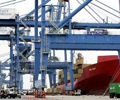OPEC+ committee lauds oil market recovery, but remains vigilant

The oil market is in recovery, allowing OPEC and its partners to ease their record production cuts on schedule, but the coalition will remain vigilant against any relapse, ministers in a key monitoring committee said July 15.
The 23-country OPEC+ coalition enacted a 9.7 million b/d production cut accord in May in response to the COVID-19 crisis, but will roll the deal back to 7.7 million b/d in August through the end of the year.
Saudi energy minister Prince Abdulaziz bin Salman said the cuts would actually be larger than 7.7 million b/d, since countries that exceeded their quotas in May and June have agreed to make extra compensation cuts in July, August and September.
An OPEC+ document seen by S&P Global Platts showed that 13 countries pumped above their quotas in the first two months of the deal by a combined 840,000 b/d, which if fully accounted for with compensation cuts, would offset nearly half of coalition’s scheduled production increase.
“The recovery signs are unmistakable,” Prince Abdulaziz said in his opening remarks of the committee meeting, which was convened online to assess market conditions and review member compliance with quotas. “We have momentum in our favor, but we have to resist the temptation to relax.”
He said that global oil demand was picking up, and seasonal consumption by many OPEC countries in the Middle East — where peaking power generation for air conditioning is largely fuelled by oil — would further tighten the market. Saudi Arabia was expecting its incremental seasonal demand to reach 500,000 b/d, he said.
“As we move to the next phase of the agreement, the extra supply resulting from the scheduled easing of production cuts will be consumed as demand continues on its recovery path,” Prince Abdulaziz said.
Russian energy minister Alexander Novak, who co-chairs the committee with the prince, said the worst of the COVID-19 crisis appears to have crested in April. But with the risk of a second wave of infections still looming, he said, the monitoring committee should continue to meet monthly to stay abreast of market developments.
The committee can recommend to the wider coalition any changes to the deal, as needed.
“Now we clearly see early recovery signs and we see moderate increase in the number of flights, sales of gasoline and diesel fuel,” Novak said. “At the same time, there’s still risk of the second wave of pandemic which can affect demand. In this context, it is extremely important that we continue to monitor situation monthly.”
Source: Platts

 Hellenic Shipping News Worldwide Hellenic Shipping News Worldwide, Online Daily Newspaper on Hellenic and International Shipping
Hellenic Shipping News Worldwide Hellenic Shipping News Worldwide, Online Daily Newspaper on Hellenic and International Shipping





















 PG-Software
PG-Software